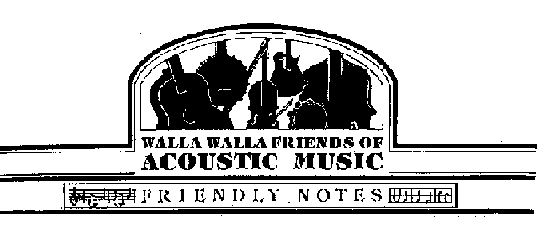
WHO
The Walla Walla Friends of Acoustic Music is an organization which supports and promotes acoustic music in many forms; folk, traditional fiddling styles, jazz, chamber music, string band music, Irish, Scottish, bluegrass and many others. We also support many forms of folk and traditional community dance.
Acoustic Music is played on instruments which are not electronically modified. (For concerts and dances the music is amplified with microphones to project the sound to a large audience).
Contra Dances-What are they?
† If you've never been to a contra dance, you may be wondering what the fuss is about. The best way to learn, of course, is to come try it, but for those who need more encouragement, here is one dancer's description (and answers to frequently asked questions).
In summary (25 words or less), it's energetic, sociable dancing, kind of like square dancing, danced with a partner to live string-band music, with the assistance of a caller.
Historically speaking, during this century contra dancing spread from New England and now can be found throughout the country. It's an American form derived from English country dancing and its relatives from Scotland and Ireland and France, and it is a cousin of square dancing (or quadrilles).
Depending on who you ask, "contra" refers to the sense of being opposite your partner, or is a corruption of the French contredans (with the same meaning), which was their misinterpretation or misappropriation of "country" dancing from the English. It's got nothing to do with Central American politics.
Choreographically speaking, contra dancing is similar to old-time square dancing, using some of the same moves, like do-si-dos and left-hand-stars. However, the couples are arranged in a line of any length, rather than a square of four couples. Another similar form is the whole-set dance, such as the Virginia Reel. In general, each couple dances with one other couple one time through a tune, then progresses to dance with the next couple in the line with each repeat of the tune. The pattern of the dance is fitted to the phrasing of "32-bars" (64-beat) reels and jigs. A caller teaches each dance, then prompts the moves during the dance only as much as is needed by the dancers. A "contra dance" evening may include the occasional old-time squares, waltzes, polkas, and Swedish hambos, and other forms too.
Socially speaking, it's sociable, in that the proper etiquette is to change partners between dances, smile a lot, and forgive the inevitable occasional mistakes made by the experienced and inexperienced. Newcomers are always welcome, and old-timers are encouraged to break them in fast - the best way to learn is to dance with an experienced dancer. After some dances, folks may go out for a late night snack and to get to know each other better.
What it's not: It's in no way similar to country-western "line dancing." In contrast to modern western square dancing, although we offer a brief introduction to the feel of the dancing (15-30 minutes before the dance), no special classes are required; each evening starts with the simplest dances, and more complex dances are presented as the evening wears on. No special costumes are required, just make sure you'll be comfortable when you work up a sweat and that your shoes are appropriate for what amounts to a long, fast walk on a very twisty path.
But, it's really hard to put into words the dizzy exhilaration of contra dancing, the driving energy of old-time music, and the wonderful feeling of friendly physical contact with other people (a rarity nowadays). You have to do it to love it.
For some other's opinions,
ask a local dancer, or check the Internet: Gary Shapiro's "What is Contra Dancing?",
or Kiran Wagle's contra dance
pages. There are lovely pictures at Doug Plummer's site.
Also, the Country Dance and Song Society
(TFTM is a group affiliate) has a site. There are more links on those
pages, on our "Other Cool Sites" page, or through the Contra Dance Web
Ring. A free-wheeling discussion can be found at the USENET news
group, rec.folk-dancing.
Thanks to Becky Nankivell
Concerts are presented which feature many area musicians as well as touring artists.
Coffeehouses are held occasionally, co-sponsored by the Walla Walla YWCA. These are open mike nights where area storytellers, singers, songwriters, musicians, writers, poets and dancers of all ages can perform in a relaxed, informal setting. Refreshments are available.
Public, Old-time dances are held generally the third Saturday of every month. They feature live music and include traditional square dances, circles, country or contra dances, cajun, swing and other forms of social dancing. Children are welcome--itís a great family experience. No alcohol is allowed, but bring snacks to share. Dance your socks off!
Sing-Alongs are an informal family gathering to sing together a capella or with insturments.
See the membership page to join us! Or just come to our events and activities! All welcome!